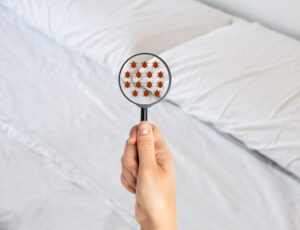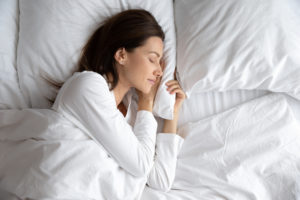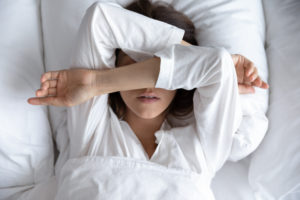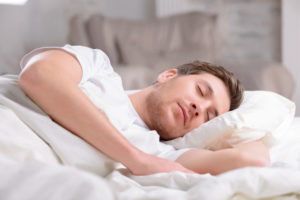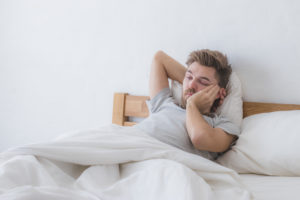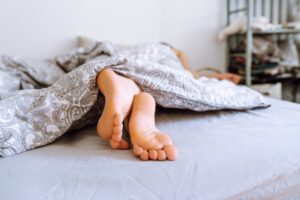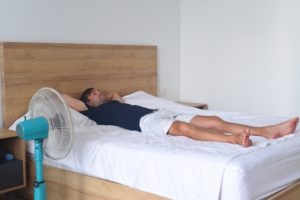Why Do I Get So Hot When I Sleep?
- Your core temperature naturally drops before sleep, spreading heat to extremities like hands and feet.
- Your sleeping environment, health conditions, and fluctuations in hormones can make you feel hot while trying to sleep.
- A cool bedroom and breathable bedding materials can help you maintain a lower body temperature throughout the night.
Waking up overheated at night can be due to many factors such as warm bedding or clothes, hot flashes, certain medications, or in some cases, a medical condition. People maintain a fairly consistent body temperature during the day which drops at night by around 1.8 degrees Fahrenheit. However, some people still feel hot at night due to their unique body composition, sleep environment, something they ate or drank, or other medical reasons.
We cover the various causes of feeling overly hot at night and discuss ways you can stay cooler during sleep.
Reasons You Get So Hot When You Sleep
There are many reasons why people may get hot while sleeping such as the kind of mattress they sleep on, fluctuations in hormones, or other factors related to their health. Identifying the contributing factors to feeling hot at night may help a person address their discomfort.
Sleep Environment
A person’s sleep environment can play a role in people becoming excessively warm throughout the night.
- Hot or humid climate: The best temperature for sleep is around 65 to 68 degrees Fahrenheit . Hot weather and warmer, humid rooms may prevent the body from cooling down.
- Heavy bedding: Some sheet and blanket materials are designed to insulate sleepers by trapping heat. Avoid insulating fabrics such as fleece and down which hold body heat, especially in summer months.
- Warm pillows and mattresses: Some pillow and mattress materials, such as memory foam, can trap heat which may be uncomfortable for hot sleepers.
- Thick sleepwear: Avoid pajamas that are thick, insulating, or not breathable such as fleece or wool.
- Sleeping partners and pets: The average adult produces between 75 and 90 watts of heat overnight, so sleeping with a partner, child, or pet could further increase the temperature of your bed to uncomfortable levels.
Is Your Sleep a Problem?
Sleep disruptions are sometimes indicative of deeper underlying issues. Answer three questions to take charge of troubled sleep.
Food And Drinks
Although research is limited, some studies suggest that certain foods and drinks can raise a person’s body temperature, including:
- Alcohol
- Caffeine
- Spicy food
- Carbohydrate or protein-rich meals
Nerve Damage
In some people, damaged nerves can cause heat intolerance, sweating, and sensations of burning in arms and legs. Sometimes these symptoms are worse at night. A wide range of conditions can lead to nerve damage such as:
- Diabetes
- Autoimmune disorders
- Kidney disease
- Long-term alcohol use
- Vitamin deficiencies
- Infections such as hepatitis C, shingles, and HIV/AIDS
- Metabolic disease
- Carpal tunnel syndrome
Additionally, some types of injuries may cause nerve damage including trauma to the nerve, exposure to extreme cold, or overly tight casts or braces.

Hot Flashes
Hormone changes that occur during pregnancy, the postpartum period, and the menopausal transition can cause hot flashes. Hot flashes are a sudden feeling of heat that starts in the chest and face then spreads to the rest of the body. They often only last a few minutes, but can be uncomfortable and cause sweating.
Hot flashes that occur at night often disrupt a person’s sleep. When nighttime hot flashes are accompanied by extreme sweating, this is referred to as night sweats.
Other Medical Conditions
Certain medical conditions that affect hormones and their treatments can also trigger feeling hot at night. Hyperthyroidism, an overactive thyroid gland, can lead to symptoms such as excessive sweating, increase in body temperature, intolerance to heat, and sleep problems.
In addition, treatments for some cancers , such as breast and prostate cancer, can cause hot flashes and night sweats, potentially due to hormone disruptions.
Medications
Antidepressant medications are the most common medication that leads to excessive sweating . Some other medicines, such as those that treat attention deficit hyperactivity disorder (ADHD) or hypothyroidism, may also lead to sweating due to increases in metabolism. Medications that affect the hormones estrogen and androgen may also cause sweating or hot flashes.
Fever
Fevers can often cause people to feel hot as the body temperature increases to fight infection. Once the fever breaks, the body begins to cool itself down by sweating.
Body Composition
People’s unique body composition may affect how they perceive temperature. Those with more lean muscle mass may produce more heat due to a higher metabolism. Additionally, some research has shown that people who weigh more may be sensitive to heat and prefer a lower temperature.
Sleep and Heat Radiation
Starting two hours before sleep and lasting until morning, the body’s core temperature cools and the skin temperature rises which may cause some people to feel warm at night. The body cools itself by releasing heat through vasodilation , meaning dilated blood vessels. This process increases blood flow to the surface of the skin, allowing heat to be released into the environment.
How to Sleep Cooler
Trying to go to bed when you are uncomfortably hot or waking up sweating can disrupt sleep. There are a number of actions you can take to optimize your sleep environment and help you sleep cooler.
Choose Breathable Bedding
Sleep on bedding, including pillows, sheets, and comforters, that are lightweight, breathable, and moisture-wicking. Choose a mattress that provides good airflow and does not trap body heat.
Turn Down the Thermostat
Reduce your room temperature before bed to around 65 to 68 degrees Fahrenheit. On cooler evenings, try opening your windows to get a breeze.
Use a Fan
Turn on a fan in your bedroom at night to cool you off.
“A cooler temperature helps with sleep in many ways, mainly by allowing the body to naturally lose heat and allowing the natural rise of melatonin within our bodies.”
Dr. Abhinav Singh, Sleep Physician
Wear Light Clothes
Sleep in loose-fitting, light clothing made from fabrics known for their breathability, such as cotton.
Stay Hydrated
Hydrate well throughout the day before bed. Your body needs water to produce sweat to help cool itself down.
Take a Warm Bath
A warm bath before bed can jumpstart the body’s process of vasodilation, helping cool you down faster in preparation for sleep.
Try Sleeping Alone
If you get overheated when sharing a bed with a partner, children, or pets, consider sleeping in a separate bed to reduce exposure to their body heat.
What to Avoid
Avoid eating carbohydrate-rich meals or spicy foods before bed or drinking caffeine or alcohol, which can all increase your body temperature. Also avoid intense exercise close to bedtime.
When Should I Be Worried About Sleeping Hot?
Some reasons for feeling hot at night are due to medical conditions that may require treatment. If you experience excessive heat that you cannot explain or if being hot at night is regularly disrupting your sleep, talk to your doctor.

Still have questions? Ask our community!
Join our Sleep Care Community — a trusted hub of sleep health professionals, product specialists, and people just like you. Whether you need expert sleep advice for your insomnia or you’re searching for the perfect mattress, we’ve got you covered. Get personalized guidance from the experts who know sleep best.
References
8 Sources
-
Coiffard, B., Diallo, A. B., Mezouar, S., Leone, M., & Mege, J. L. (2021). A Tangled Threesome: Circadian Rhythm, Body Temperature Variations, and the Immune System. Biology, 10(1), 65.
https://pubmed.ncbi.nlm.nih.gov/33477463/ -
Improve Sleep: Tips to Improve Your Sleep When Times Are Tough. CDC. (2020, September 22).
https://blogs.cdc.gov/niosh-science-blog/2020/06/29/sleep-hwd/ -
Garby, L., Kurzer, M. S., Lammert, O., & Nielsen, E. (1987). Energy expenditure during sleep in men and women: evaporative and sensible heat losses. Human nutrition. Clinical nutrition, 41(3), 225–233.
https://pubmed.ncbi.nlm.nih.gov/3610667/ -
Peripheral neuropathy: MedlinePlus Medical Encyclopedia.
https://medlineplus.gov/ency/article/000593.htm -
Cancer treatment: dealing with hot flashes and night sweats: MedlinePlus Medical Encyclopedia.
https://medlineplus.gov/ency/patientinstructions/000826.htm -
Smetana, G.W. (2023, May 10) Evaluation of the patient with night sweats or generalized hyperhidrosis. In R. Benca (Ed.). UpToDate.
https://www.uptodate.com/contents/evaluation-of-the-patient-with-night-sweats-or-generalized-hyperhidrosis -
Schweiker, M., Huebner, G. M., Kingma, B. R. M., Kramer, R., & Pallubinsky, H. (2018). Drivers of diversity in human thermal perception – A review for holistic comfort models. Temperature (Austin, Tex.), 5(4), 308–342.
https://pubmed.ncbi.nlm.nih.gov/30574525/ -
Francisco, M. A., & Minson, C. T. (2018). Cutaneous active vasodilation as a heat loss thermoeffector. Handbook of clinical neurology, 156, 193–209.
https://pubmed.ncbi.nlm.nih.gov/30454590/






